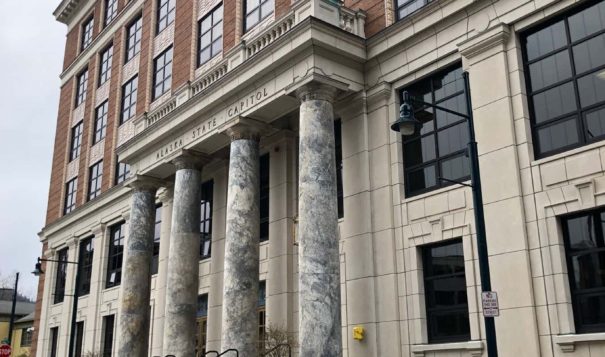
State Legislature has until today to override vetoes, but elected representatives cannot even agree about where to meet ** a correction has been made to this story
Alaska is headed into a budget crisis despite owning one of the fattest pocketbooks in the nation. The Alaska Legislature has until close of business on July 12 to override $444 million in line item vetoes by Gov. Mike Dunleavy.
Economists, former governors, dozens of organizations of all types, including Alaska Native organizations, and thousands of Alaskans say the cuts will drive Alaska over a fiscal cliff.
The vetoes are almost certain to stand, however, because Alaska’s 60 state legislators can’t even agree to meet in the same town, much less muster the three-fourths majority, or 45 votes, needed to override the governor’s action.
About a third of the legislators initially answered the governor’s call for the Legislature to meet in Wasilla, a town 45 miles outside Anchorage. Two-thirds convened in Juneau, the state capital. Legislative attorneys advised them that the governor can call a special session of the Legislature and select the subject of the session but can’t tell them where to meet.
The legal opinion says the proposed meeting place in a Wasilla middle school lacks the telephone and telecommunications systems, voting apparatus, offices and meeting rooms, and security needed to conduct legislative business.
And, indeed, protestors took over the middle school gym Thursday, preventing legislators from even taking their seats. The legislators in Wasilla don’t constitute a quorum so can’t conduct Legislative business anyway.
Economists, former governors, leaders in education, health, labor and business, and even members of the governor’s own party say the cuts, which add up to about ten percent of state spending, are more than ill-advised, they verge on disastrous. Sen. Natasha von Imhof, R- Anchorage, said: “I cannot fathom why the governor is purposely throwing Alaska into a severe economic recession.”
Dunleavy says the cuts are necessary in order to pay Alaskans about $3,000 each as their share of oil revenues. Moreover, in a prepared statement, Dunleavy said over the past several years the state has used $14 billion from savings to subsidize the government, and, “This situation, everyone agrees, is not sustainable.”
Alaska does not have an income tax.
Meanwhile, with $64 billion stashed away in a Permanent Fund created with revenues from oil development, the state is one of the nation’s wealthiest.
The University of Alaska was a direct hit from the governor’s vetoes with a 40 percent cut. Medicaid was cut by $50 million. Funding was reduced for senior benefits, public assistance, and public broadcasting, as well as public assistance to the blind and disabled. Some of the vetoed line items were a match to federal funding, which means a loss of up to a billion dollars paid by the federal government to the state.
For decades, oil revenues have covered about 90 percent of the cost of state government. Production on the North Slope has declined since its peak in 1988 and the price of oil has dropped from more than a hundred dollars a barrel to the sixty-dollar a barrel range. The state has a budget deficit. Alaska has no income tax nor statewide sales tax.
Voices:
